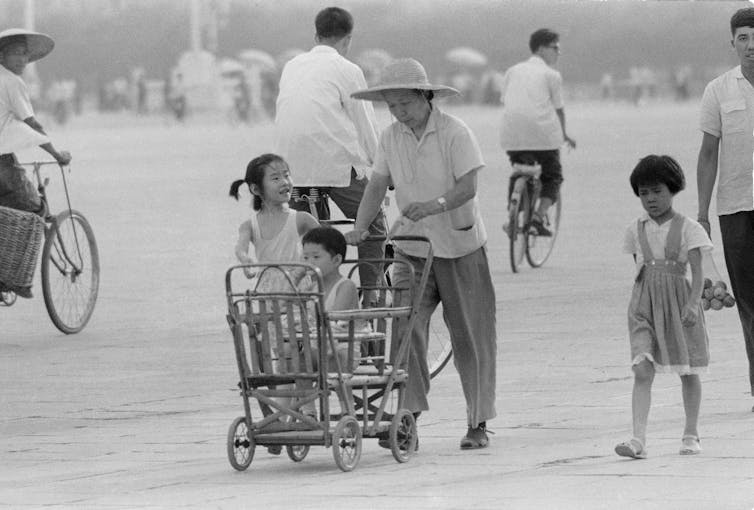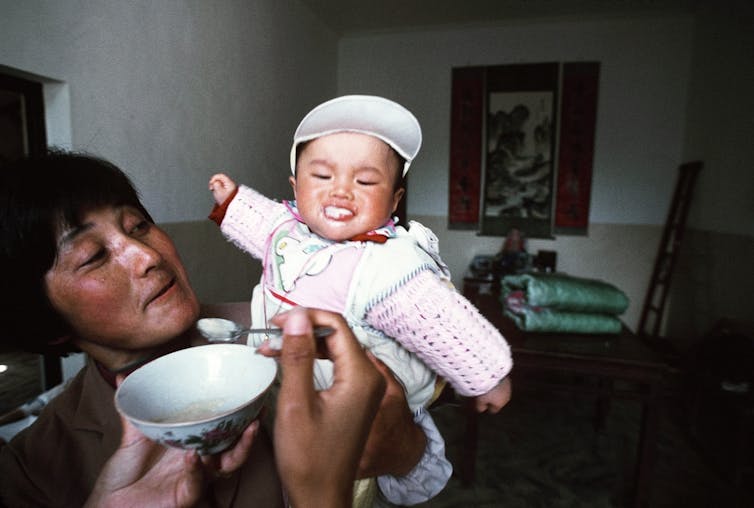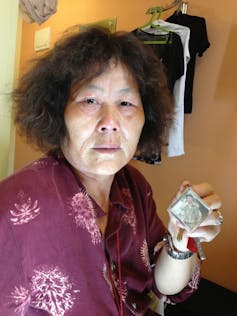China's 'one-child policy' left at least 1 million bereaved parents childless and alone in old age, with no one to take care of them
- Written by Lihong Shi, Associate Professor of Anthropology , Case Western Reserve University
A child’s death is devastating to all parents. But for Chinese parents, losing an only child can add financial ruin to emotional devastation.
That’s one conclusion of a research project on parental grief I’ve conducted in China since 2016[1].
From 1980 to 2015, the Chinese government limited couples to one child only. I have interviewed over 100 Chinese parents who started their families during this period and have since lost their only child – whether to illness, accident, suicide or murder. Having passed reproductive age at the time of their child’s death, these couples were unable to have another child.
In 2015, the Chinese government raised the birth limit to two, an effort to reverse declining birthrates and to rejuvenate an aging population[2]. In May 2021, it announced that Chinese families could have up to three children.
The new “three-child policy” received generally lukewarm responses in China[3]. Many Chinese couples say they prefer not to have multiple children[4] due to the rising cost of child rearing, how it would complicate women’s professional aspirations and declining preference for a son.
The childless parents I interviewed told me they felt forgotten as their government moves further away from the birth-planning policy that left them bereaved, alone and precarious in their old age – in a country where children are the main safety net for the elderly[5].
Having and losing an only child
China’s one-child policy was a massive social engineering project launched to slow down rapid population growth and aid economic development efforts.
Until the early 1970s, most Chinese women had at least five children[6]. By 1979, China’s population had nearly reached 1 billion[7] – up from 542 million in 1949[8]. The Chinese government claimed that the one-child limit prevented 400 million births in China, although this calculation has been disputed[9] as an exaggeration.
 A family strolls in Beijing, 1972.
AP Photo/Horst Faas[10]
A family strolls in Beijing, 1972.
AP Photo/Horst Faas[10]
The birth limit was unpopular at first.
“Back then, we wanted to have more children,” said a bereaved mother who was in her 60s when I interviewed her in 2017. “My parents had an even harder time accepting that we were allowed to have only one child.”
To enforce the unpopular one-child policy, the Chinese authorities designed strict measures[11], including mandatory contraception and, if all else failed, forced abortion.
Those who violated the policy paid a financial penalty, and children from unauthorized births often could not be registered for citizenship status and benefits[12]. Parents who worked for the government – and under China’s economic system, many urban workers did – risked losing their job if they had more than one child.
Several bereaved mothers told me that they had gotten pregnant with a second or third child in the 1980s or 1990s but had an abortion for fear of job loss.
The one-child policy, while painful, contributed to an age structure that benefited the economy: The large working-age population born before and after it grew rapidly compared to the country’s younger and older dependent population.
This “demographic dividend” accounted for 15% of China’s economic growth between 1982 and 2000[13], according to a 2007 United Nations working paper.
An uncertain old age
Yet China’s one-child policy also created a risk for couples: the possibility of becoming childless in old age.
 The original caption of this 1994 photo accompanying an article on China’s one-child policy was: ‘A baby is fed by its mother. The child is probably never to have a sister or brother.’
Peter Charlesworth/LightRocket via Getty Images[14]
The original caption of this 1994 photo accompanying an article on China’s one-child policy was: ‘A baby is fed by its mother. The child is probably never to have a sister or brother.’
Peter Charlesworth/LightRocket via Getty Images[14]
“Families with an only child are walking on a tightrope. Every family can fall off the tightrope at any moment” if they lose their only child, one bereaved mother explained to me.
“We are the unlucky ones,” she said.
In China, where the pension[15] and health care[16] systems are patchy and highly stratified, adult children are the main safety net for many aging parents. Their financial support is often necessary after retirement.
It is estimated that 1 million Chinese families had lost their only child by 2010[17]. These childless, bereaved parents, now in their 50s and 60s, face an uncertain future.
Due to the country’s longstanding tradition of filial piety, children also have a moral obligation to support their aging parents[18]. Parental care is actually the legal responsibility of children in China; it is written into the Chinese Constitution[19].
This safety net does not exist for parents who lost the only child the government would let them have.
Help, but not enough
Over the past decade, groups of bereaved parents have negotiated with the Chinese authorities[20] to demand financial support and access to affordable elder care facilities. Those I interviewed said they had fulfilled their obligation as citizens by abiding by the one-child rule and felt the government now had the responsibility to take care of them in their old age.
 A bereaved parent of the one-child era shows a picture of her late son.
William Wan/The Washington Post via Getty Images[21]
A bereaved parent of the one-child era shows a picture of her late son.
William Wan/The Washington Post via Getty Images[21]
Eventually, the authorities responded to their grievances.
Starting in 2013, the government has initiated multiple programs for bereaved parents, most notably a monthly allowance, hospital care insurance and in some regions subsidized nursing home care.
However, bereaved parents told me that these programs were insufficient to meet their elder care needs.
For example, adult children often take care of their parents during hospitalization, bathing them and buying meals. Private care aides can charge up to US$46 a day, or 300 yuan, to do these tasks. In regions that now provide government-paid hospital care insurance for childless parents[22], most plans cover between $15.50 to $31 – about 100 to 200 yuan – daily for a care aide, based on my research.
Other people I interviewed worried about the high cost and limited availability[23] of quality nursing homes in many regions. China’s elder care facilities cannot meet the demand of its aging population, and living in these facilities is not covered by insurance.
China’s controversial one-child policy is history, but its legacy may depend on how the Chinese authorities treat the grieving parents left in its wake.
[The Conversation’s Politics + Society editors pick need-to-know stories. Sign up for Politics Weekly[24].]
References
- ^ research project on parental grief I’ve conducted in China since 2016 (www.sixthtone.com)
- ^ reverse declining birthrates and to rejuvenate an aging population (www.nytimes.com)
- ^ lukewarm responses in China (theconversation.com)
- ^ not to have multiple children (www.sup.org)
- ^ children are the main safety net for the elderly (www.cambridge.org)
- ^ had at least five children (data.worldbank.org)
- ^ 1 billion (data.worldbank.org)
- ^ up from 542 million in 1949 (www.gov.cn)
- ^ this calculation has been disputed (onlinelibrary.wiley.com)
- ^ AP Photo/Horst Faas (newsroom.ap.org)
- ^ strict measures (link.springer.com)
- ^ unauthorized births often could not be registered for citizenship status and benefits (anthrosource.onlinelibrary.wiley.com)
- ^ 15% of China’s economic growth between 1982 and 2000 (catalog.ihsn.org)
- ^ Peter Charlesworth/LightRocket via Getty Images (www.gettyimages.com)
- ^ pension (onlinelibrary.wiley.com)
- ^ health care (www.tandfonline.com)
- ^ lost their only child by 2010 (www.chinadaily.com.cn)
- ^ children also have a moral obligation to support their aging parents (www.cambridge.org)
- ^ Chinese Constitution (www.gov.cn)
- ^ groups of bereaved parents have negotiated with the Chinese authorities (www.reuters.com)
- ^ William Wan/The Washington Post via Getty Images (www.gettyimages.com)
- ^ government-paid hospital care insurance for childless parents (www.xinhuanet.com)
- ^ limited availability (www.sixthtone.com)
- ^ Sign up for Politics Weekly (theconversation.com)

















